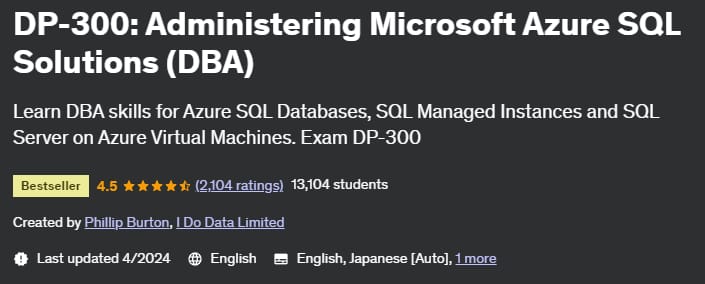Description
DP-300: Administering Microsoft Azure SQL Solutions (DBA), the Microsoft Azure SQL Solutions (DBA) training course is published by Udemy Academy. This course covers the requirements for the Microsoft DP-300 certification and focuses on managing Azure SQL Databases, Azure SQL Managed Instances, and SQL Server in Azure Virtual Machines. We’ll focus most of the course on Azure SQL Databases and then look at additional functionality for managed instances and SQL Server in Azure virtual machines. In the first part of this course we will focus on Azure SQL Database. We’ll start by getting a free trial of Azure, installing SQL Server Management Studio, and briefly reviewing the 6 main clauses of the SELECT statement. Then we will explore how to optimize query performance and evaluate performance improvement. Then we’ll look at the different data platform sources and how they compare.
After this, we’ll cover configuring Azure SQL Database resources for scale and performance, including serverless and provisioned, vCore and DTU, and database partitioning techniques. We will then evaluate migration strategies to Azure. Next, we will discuss how to implement a secure environment for your Azure SQL database. We’ll cover how to configure database authentication and authorization using platform and database tools. How to implement security for data at rest and in transit. and how to implement compliance controls for sensitive data. After this, we will examine how to monitor and optimize operational resources. This includes monitoring activity and performance, performing performance-related maintenance tasks, and identifying performance-related issues. Finally, for our Azure SQL database, how to automate tasks and perform database backup and recovery using database tools, recommend an HADR strategy for a data platform solution, and more on implementing management using T-SQL we will pay.
What you will learn
- Plan and implement data platform resources
- Implement a secure environment
- Monitoring and optimization of operational resources
- Query performance optimization
- Perform task automation
- Plan and implement a high availability and disaster recovery (HADR) environment
- Implementation of management using T-SQL
Who is this course suitable for?
- If you want to implement or manage the operational aspects of cloud and hybrid data platform solutions based on Azure Data Services and SQL Server, this course is for you.
- You can be a database administrator or data management specialist managing on-premise and cloud relational databases built with Microsoft SQL Server and Microsoft Azure Data Services.
- At the end of this course, after entering the official practice test, you can take the official Microsoft DP-300 test
Course specifications DP-300: Administering Microsoft Azure SQL Solutions (DBA)
- Publisher: Udemy
- teacher : Phillip Burton , I Do Data Limited
- English language
- Education level: introductory
- Number of courses: 164
- Training duration: 17 hours and 18 minutes
At the beginning of the course seasons on 2024-4
Course prerequisites
- You will need to already be familiar with the 6 principal clauses of the SELECT statement – SELECT, FROM, WHERE, GROUP BY, HAVING and ORDER BY
- It will also be good if you have had prior experience with Azure – but this is not essential.
- A lot of this course will use SQL Server Management Studio (SSMS). The latest version requires 64-bit Windows, but you could use SSMS 17.9.1 if you have 32-bit Windows.
- If you have a Mac, then you can use Azure Data Studio for querying, but that doesn’t have all of the management capabilities of SSMS.
- For accessing the Azure portal, you will also need an internet browser (Edge or Chrome preferred).
- There is a 30-day refund guarantee of this Udemy course (see Udemy’s refund policy).
- Why not have a look at the curriculum below and see what you can learn?
Pictures

Sample video
Installation guide
After Extract, view with your favorite Player.
English subtitle
Quality: 720p
download link
File(s) password: www.downloadly.ir
Size
3.86 GB